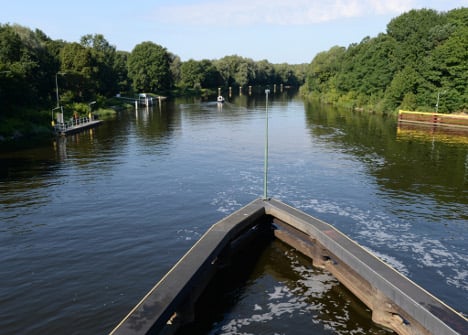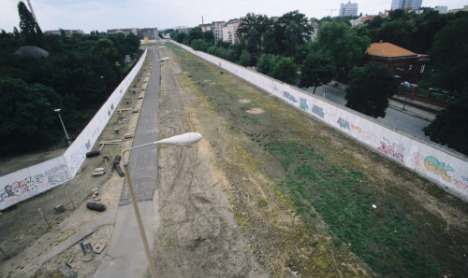Richter, now 66, loved to swim in the sparkling lakes of Potsdam as a teenager living behind the Iron Curtain, quietly dreaming of liberty and adventure in the West.
"I reached a point where I no longer believed the regime could be changed from within," he told AFP ahead of celebrations marking the 25th anniversary of the fall of the Berlin Wall.
His first "stupid" attempt to quit communist East Germany came in January 1966 but ended abruptly when he as a teenager was caught on a train with fake papers bound for Austria.
Escape to Hamburg
Richter would have more luck just seven months later with a reckless plan: swimming across the Teltow Canal separating the East German region of Brandenburg from West Berlin.

"I had to rely on my strength and had been working on toughening up," he said.
Richter slipped into the chilly canal and it would take him four hours filled with heart-stopping moments of dread until he reached land again.
"A swan attacked me, dogs were barking, I had to wait several times and dive underwater until the coast was clear," he said.
"I had hypothermia and was exhausted when I finally made it, and passed out on shore."
Having cleared only a short distance, past border guards with shoot-to-kill orders, Richter had arrived in a different world.
He worked in the shipping industry in the West German port city of Hamburg and even made it as far as New Orleans where he roamed the jazz clubs of Bourbon Street before eventually going back home to study.
But a sense of solidarity with those still trapped behind the Wall gnawed away at him.
"I wanted to help other people," he said.
The opportunity arose in 1972 when the East German government, seeking international recognition, loosened the rules for West Germans to visit.
Richter managed to help more than 30 friends and acquaintances to the West by ferrying them to freedom in his car's boot.
"It was a lot of fun," he said. "I saw myself in them, back there in the Teltow Canal."
Luck runs out
But his good fortune ran out at a checkpoint on March 4th, 1975, with his sister and her fiance in the car.
"I knew that they could conduct an inspection if they were suspicious," he said of the East German authorities.
"I had to pull into a garage. There were border guards waiting for me with machine guns. And then one came over with a dog, which jumped on the boot of the car."
The terrified couple was yanked from the car and Richter seized by the guards.
"I flew against the wall and apparently cried out 'Just shoot, you criminals!' I can't even remember."
The next thing he knew, two men in long, white coats appeared, handcuffed him and bundled him into a van.
Richter was handed the maximum sentence of 15 years.
He said worse than the occasional beatings during his term, most of which he served at the notorious Bautzen facility outside Dresden, were the head games of the prison staff.
"The Stasi was better than those who trained them, the Soviets," he said.
"They used disinformation so the other prisoners would think that you were an informer. I didn't know for eight months where my sister was."
In 1980, the West German government finally bought his release under a programme by which the communist regime traded prisoners for hard currency.
Annoying the Stasi
He finished his studies in West Germany and visited West Berlin regularly.
Richter tried to feed mounting unrest in the East, printing propaganda fliers against the regime which he tossed over the Wall.
"That really annoyed the Stasi," he said with a satisfied grin.
When the night of November 9th, 1989 finally came, East German authorities made the shock announcement that they were opening the border.
Richter raced to the Brandenburg Gate in the heart of the city, then to the Bornholmer Strasse border crossing "where I saw an endless stream of people coming through and we wept together".
"I was so happy for them, it still brings tears to my eyes," he said.
He said although a quarter-century has passed, many former Stasi officers still actively resist attempts to mark this dark chapter of Germany's past.
"No one wants to play down the Nazis' atrocities but they use them to deflect attention from their own crimes," he said.
Richter is pleased that the days of such high drama are now over. But he wishes leaders such as Chancellor Angela Merkel and President Joachim Gauck, both of whom grew up in the East, were more "radical" in demanding justice for the regime's victims.
Berlin today has several memorials to the at least 136 people who died trying to flee East Germany, including small white crosses along waterways.



 Please whitelist us to continue reading.
Please whitelist us to continue reading.
Member comments